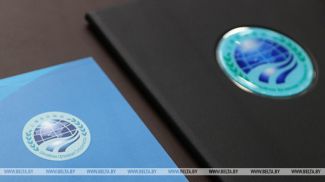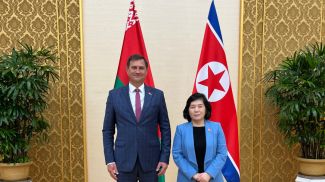
MINSK, 8 January (BelTA) – Belarus will refrain from inviting observers of the Organization for Security and Cooperation in Europe (OSCE) for the forthcoming elections, which will take place on 25 February 2024, BelTA learned from Andrei Dapkiunas, Belarus’ permanent representative to international organizations in Vienna.
Belarus has always approached the fulfillment of its international obligations responsibly, has traditionally invited OSCE observers to various Belarusian elections even despite their primarily biased evaluations and conclusions, Andrei Dapkiunas pointed out.
But this time Belarus has decided not to invite OSCE observers. Belarus’ permanent representative notified Matteo Mecacci, Director of the OSCE Office for Democratic Institutions and Human Rights (ODIHR), about it by phone. “Upon instructions of the Ministry of Foreign Affairs I told the OSCE ODIHR director that Belarus will refrain from inviting an OSCE observation mission to the parliamentary elections of 25 February. I presented Belarus’ arguments and motivation to the OSCE ODIHR director,” Andrei Dapkiunas explained.
The decision has been prompted first of all by the state of the OSCE election observation system. The system suffers from certain geographical functional imbalance. For instance, there are problems with the format of observation and with the unequal number of observers, who are sent by the OSCE ODIHR to the west and to the east of Vienna. There is also the problem of traditional domination of representatives of Western countries in these OSCE missions. “We believe that this misbalance has become possible due to the absence of the OSCE’s common norms, standards, which are embraced by all the countries in matters concerning international observation of elections,” Andrei Dapkiunas said. “Belarus has repeatedly drawn attention to the matter. In order to forestall the use of these double standards, Belarus together with Russia and other allies has repeatedly suggested working out unified norms for election monitoring. Unfortunately, this initiative has been rejected and the OSCE still practices double standards with regard to election observation.”
According to the diplomat, Belarus is ready to continue demanding the introduction of clear standards and making sure that OSCE observations rely on approaches, which all the participating states uphold.
The second important reason behind Belarus’ decision is the degradation of the atmosphere of interstate interaction in the OSCE space, including in bilateral relations and inside the organization itself. The process has reached a critical point and has resulted in an acute crisis of trust, in violations of traditions of a respectful and diplomatically correct dialogue. Hostility and ostracism in relations between countries are on the rise. The introduction of unjustifiably tough political and economic sanctions by Western countries against Belarus, including against the Central Election Commission (CEC) and the parliament, is a vivid manifestation of that. “With this move, they have completely undermined trust in their ability to provide objective observation of the election process in Belarus,” he remarked.
For instance, the European Union’s visa restrictions apply to Belarusian MPs and representatives of the Central Election Commission. They are essentially forbidden to participate in election observations via the OSCE ODIHR and the OSCE Parliamentary Assembly in European Union countries. “It creates unequal conditions for the participation of national observers in the work of OSCE bodies,” Andrei Dapkiunas stressed.
Another factor that makes inviting international OSCE observers difficult is the worsening of logistical opportunities for entering and leaving Belarus due to the fault of the West: western neighbors have closed a number of land border crossings and have restricted transportation by air.
“The Belarusian government believes that the sanctions introduced by Western countries flagrantly violate commitments within the framework of the OSCE and basic principles of the organization. First of all, the freedom of movement and interpersonal contacts. The sanctions impede economic growth, sustainable development, efforts to increase the prosperity of nations. They violate traditional transport and logistic chains and undermine the interconnectivity, which is emphasized by the resolution released by the OSCE council of ministers of foreign affairs in Hamburg in 2016. Unfriendly actions continue. The rhetoric of Western countries towards Belarus on the basis of so-called ‘punishment for co-aggression’ is getting more and more aggressive,” Belarus’ permanent representative said.
At the same time Belarus’ decision to refrain from inviting OSCE observers to the elections of 25 February 2024 does not indicate wholesale rejection of cooperation within the framework of the OSCE-sponsored election observation, Andrei Dapkiunas pointed out. “Belarus will be ready to revise its approaches towards inviting OSCE observers if the West finds the strength, the courage, the possibility to abandon the policy of sanctions and attempts to interfere in Belarus’ domestic affairs,” he stressed. “Belarus remains open to unbiased election observation, which will be traditionally organized within the framework of the Commonwealth of Independent States, the Collective Security Treaty Organization, the Union State of Belarus and Russia, the Shanghai Cooperation Organization, and by individual observers, who are ready for an objective evaluation of the election campaign in the country.”











